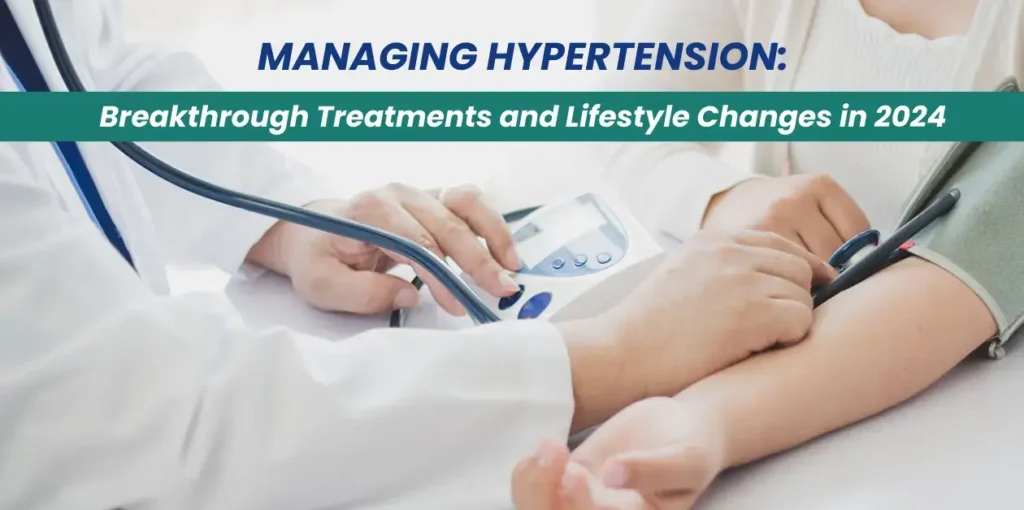Managing Hypertension: Breakthrough Treatments and Lifestyle Changes in 2024

Hypertension, or high blood pressure, is a common condition that increases the risk of heart disease, stroke, and other health problems. In 2024, new treatments and lifestyle changes are helping individuals manage hypertension more effectively. This blog explores the latest advancements and provides tips for maintaining healthy blood pressure levels.
Breakthrough Treatments
In 2024, several new medications and therapies have been developed to treat hypertension. One such advancement is the use of angiotensin receptor-neprilysin inhibitors (ARNIs). These drugs combine two mechanisms to lower blood pressure and improve heart function. Clinical trials have shown that ARNIs are effective in reducing blood pressure and preventing cardiovascular events.
Renal Denervation
Another promising treatment is renal denervation, a minimally invasive procedure that targets the nerves in the kidneys to reduce blood pressure. This procedure has shown positive results in patients with resistant hypertension who do not respond to traditional medications. Renal denervation works by disrupting the nerve signals that contribute to high blood pressure, leading to sustained reductions in blood pressure levels.
Lifestyle Changes
In addition to medication, lifestyle changes play a crucial role in managing hypertension. A healthy diet, regular exercise, and stress management are essential for maintaining healthy blood pressure levels.
Diet
A diet rich in fruits, vegetables, whole grains, and lean proteins can help lower blood pressure. The DASH (Dietary Approaches to Stop Hypertension) diet is particularly effective, emphasizing foods high in potassium, calcium, and magnesium while reducing sodium intake. Reducing the consumption of processed foods, which are often high in sodium, can also help manage blood pressure.
Exercise
Regular physical activity helps maintain a healthy weight and reduces blood pressure. Aim for at least 150 minutes of moderate-intensity exercise, such as brisk walking or cycling, each week. Strength training exercises can also be beneficial. Exercise helps improve cardiovascular health, reduce stress, and promote overall well-being.
Stress Management
Chronic stress can contribute to high blood pressure. Practicing relaxation techniques, such as deep breathing, meditation, and yoga, can help manage stress and improve overall well-being. Finding healthy ways to cope with stress, such as engaging in hobbies or spending time with loved ones, is also important.
Monitoring and Regular Check-ups
Regular monitoring of blood pressure is essential for managing hypertension. Home blood pressure monitors allow individuals to track their levels and make necessary adjustments to their treatment plans. Regular check-ups with healthcare providers ensure that blood pressure is well-controlled and any complications are addressed promptly.
The Role of Technology in Hypertension Management
In 2024, technology is playing a significant role in managing hypertension. Wearable devices and mobile apps are helping individuals monitor their blood pressure in real-time, track their physical activity, and manage their diet. These tools provide valuable insights and reminders, making it easier for individuals to adhere to their treatment plans and make healthier lifestyle choices.
Wearable Devices
Wearable devices, such as smartwatches and fitness trackers, can monitor blood pressure, heart rate, and physical activity levels. These devices provide real-time data and alerts, helping individuals stay on top of their health. Some wearables also offer features like guided breathing exercises and stress management tools, further supporting hypertension management.
Mobile Apps
Mobile apps designed for hypertension management can track blood pressure readings, medication adherence, and lifestyle habits. These apps often include features like reminders for taking medications, logging physical activity, and tracking dietary intake. Some apps also offer educational resources and support communities, providing additional motivation and guidance.
Telemedicine
Telemedicine is making it easier for individuals to access healthcare services and manage their hypertension. Virtual consultations with healthcare providers allow for regular monitoring and adjustments to treatment plans without the need for in-person visits. Telemedicine also provides a convenient way to receive expert advice and support, particularly for individuals in remote or underserved areas.
The Importance of a Support System
Having a strong support system is crucial for managing hypertension. Family, friends, and healthcare providers can offer encouragement, accountability, and practical assistance. Support groups and online communities can also provide valuable resources and a sense of camaraderie. Sharing experiences and challenges with others who understand can make it easier to stay motivated and committed to managing hypertension.
Conclusion
Managing hypertension requires a combination of medication, lifestyle changes, and regular monitoring. With the latest advancements in treatment and a commitment to healthy habits, individuals can effectively control their blood pressure and reduce the risk of serious health problems. Embracing technology and building a strong support system can further enhance hypertension management, leading to better health outcomes and an improved quality of life. By staying informed and proactive, individuals can take charge of their health and navigate the challenges of hypertension with confidence.
About Author
Dr. Y Swetha
MBBS ,MD General Medicine
Dr. Y Swetha is a skilled physician currently practicing at PI Health Cancer Hospital. She holds an MBBS from Kamineni Institute of Medical Sciences and an MD in General Medicine from Prathima Institute of Medical Sciences. Dr. Swetha has extensive experience in outpatient, inpatient, emergency, and critical care settings. She is proficient in managing chronic conditions, critical emergencies, and advanced procedures such as ventilator management and catheter placements. Her academic contributions include presentations on deep vein thrombosis, splenic infarcts, and cardiac tamponade. Dr. Swetha also volunteered as a Telemedicine Doctor during the COVID-19 pandemic, demonstrating her commitment to patient care. With a First Class in MD and fluent in English, Telugu, and Hindi, Dr. Swetha is dedicated to providing compassionate and comprehensive medical care.

